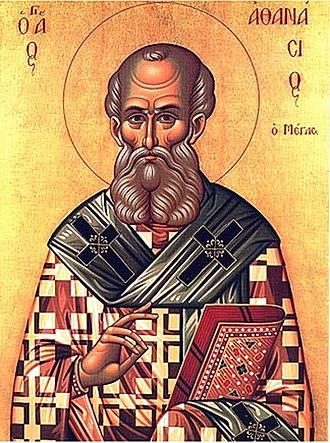

Athanasius of Alexandria (300s) is one of the most important figures in all of Christian history. God used him more than any other single individual to ensure that Christianity would have a proper understanding of the Trinity. However, the Trinity was not the only subject on which God used him to clarify Christian understanding.
Athanasius also grappled profoundly with a theological question that might be called the “Divine Dilemma.” How should God respond to humanity’s fall? Since God is love, the impulse of his nature is to redeem and forgive. Yet he has given his word that Adam and Eve would die if they ate from the tree. What should he do?
Before we get any further, we should clarify that we are dramatizing and humanizing what for God was known long before he created Adam and Eve. God knew they would sin before he ever told them they would die. God knew how he would respond before they ever sinned. We are putting the dilemma in human terms to make it more understandable.
The dilemma Athanasius outlines is this: God, in his truthfulness, has declared that the consequence of sin is death. And yet, God, in his goodness and love, does not want to simply abandon his creation. After all, Adam and Eve were created in his own image. His nature as love is not willing to abandon them to destruction and annihilation.
To fully grasp this, we first have to acknowledge the importance of the body in the Christian faith. The Bible clearly teaches that bodies matter. Not only are they essential to our existence, but they also carry the burden of the fall. In our bodies, as well as our spirits, we experience the physical and spiritual consequences of sin. As a result, bodies can often feel like burdens, afflicted by illness, aging, and death. Moreover, they are susceptible to sinful desires that counter God’s intentions for humanity.
Against this backdrop, Athanasius’ Divine Dilemma becomes even more pronounced. If God is to remain true to his word, then the wages of sin, death, must be addressed. On the other hand, God’s inherent nature of love and goodness drives him to act on behalf of his creation. He does not want his image-bearers to drift into the abyss of evil and hell.
The Word became flesh and made his dwelling among us.
John 1:14
It is in this conundrum that the Incarnation emerges as the solution. God becoming flesh, as narrated in John 1:14, is the response to this Divine Dilemma. The Incarnation is the tangible demonstration of God’s commitment to his creation. Jesus Christ, the eternal Word, becomes flesh, fully God and fully human.
This dual nature is vital. His divinity ensures that he alone, as God, can provide salvation. Only God can truly save. A creature cannot save another. At the same time, Jesus’ humanity ensures that every facet of human nature is represented and hence redeemed, based on the assertion of early church fathers like Gregory of Nyssa and Cyril of Alexandria that what is not assumed in the Incarnation is not healed.
What is not assumed cannot be healed.
- Gregory of Nazianzus
Jesus, in his full humanity, endured every aspect of human existence, from bodily desires to life’s trials. Yet, he remained sinless (e.g., Heb. 4:15). His life, death, and resurrection served to counteract the effects of the fall, turning the tables on death and sin. By taking on human nature in its entirety, Christ paved the way for its complete redemption.
One might wonder, as Athanasius anticipated, why an omnipotent God did not merely forgive humanity’s transgressions with a mere declaration. To this, Athanasius responds that while God is all-powerful, he is also committed to justice and truth. The ramifications of sin had to be addressed. In addition, God’s intention was not just salvation at a distance. He wanted to weave life back into the very fabric of human nature, combating the dominion of death from within.
Athanasius’ Divine Dilemma and its resolution through the Incarnation underline the profound significance of the human body in Christian theology. God does not merely value bodies. He took one upon himself. This fact not only accentuates the body’s inherent goodness and dignity but also points to God’s relentless pursuit of its redemption. The miracles Jesus did, especially his healings, further underline God’s intent to restore and redeem our bodies, pointing towards the eschatological hope of a future resurrection where bodies will be fully glorified.